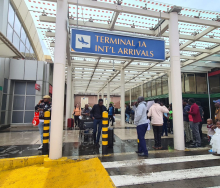The rise of electronic travel authorisations and permission-based travel is imminent. Between ETA, ESTA and ETIAS, destinations are growing more specific about what types of travellers they want to attract, and whether they need a visa.
In 2022, the UK announced that it would launch an Electronic Travel Authorisation (ETA) scheme that would require non-visa travellers who are not British nationals or residents to answer a set of ‘suitability questions’ to have automated border screening before entering the country.
The scheme was introduced as a part of a “contactless” digital border, explained Priti Patel, the British Home Secretary from 2019 to 2022.
Passengers will undergo pre-screening and will have to provide a valid biometric passport from an eligible country, a photo of themselves, travel details or an itinerary, an email address, credit or debit card details and biographic information to be identified at the border via new technology.
Similar to the US Electronic System for Travel Authorisation (ESTA), travellers will receive ETA approval within 72 hours of completing the application.
The European Union’s European Travel Information and Authorisation System (ETIAS) uses the same concept to verify non-EU citizens from 60 countries around the world that do not require a visa to travel within the EU.
The founder of the tourism consultancy firm Curiositas, Sabine Lehmann, wrote an academic article about the growing importance of permission-based travel, titled ‘Pick me! I am young, healthy and interested in the arts in your city!’.
The article explains the restrictions implemented by destinations to attract upstanding, rather than masses of tourists.
“Visa restrictions are an efficient method for governments to restrict access in advance of travel, Lehmann told 702.co.za. “COVID pushed all of this to new extremes, with requirements for proof of negative viral tests, further vaccination requirements and wearing a mask, reinforcing the idea that travel is highly conditional and jumping through extra hoops is simply part and parcel of this experience,” she adds.
Lehmann believes that the concept of permission-based travel is aimed at proving to a destination that they would be a ‘quality tourist’. This includes alignment with a destination’s specific needs, identity, morals, etiquette, and beliefs in a way that will contribute to the destination’s economy without compromising the quality of life of its residents.
Among the UK ETA’s suitability requirements and reasons for denying applications are exclusion or deportation orders, criminality, previous breach of immigration law, false representation, debt to the UK National Health Service and unpaid litigation costs.
However, the requirement that resembles Lehmann’s argument is the category called non-conducive grounds. According to gov.uk, this means that the applicant’s presence in the UK is not conducive to the public good because of their conduct, character, associations or other reasons.
Many other ETAs accept applications based on similar judgements of character, financial status and history.
Essentially, the requirements allow destinations to find the right balance between tourism traffic that does not harm the locals and the environment, while also sufficiently supporting the local economy.
Some destinations have already implemented similar restrictions based on this approach.
Lehmann notes that the Kingdom of Bhutan controls visitor numbers by implementing tourist fees that mandate a minimum daily spend, which limits annual tourist arrivals and protects the country from over-tourism.
Additionally, the Republic of Palau requires tourists to sign a mandatory eco-pledge before entry, emphasising the importance of sustainable environmental practices.
Meanwhile, to attract high-earning professionals, Iceland grants visitors that earn more than ISK1 million (R136 400) a month a six-month visa.
“The hope is that this visa regime will entice high-earning tourists to stay longer, travel slower, visit less popular Icelandic attractions and consider travelling out of the peak tourism season,” she explains.
The implementation of the approach would change the relationship between destinations and their visitors. At the same time, it raises ethical questions around inclusivity and fairness.
As one example, implementing permission-based travel could further push the agenda that travel should only be available to the elite, be it financially or in terms of professional qualification.
“Of course, it’s hard to say whether a shift to a system that requires us to demonstrate our individual value to destinations will democratise travel or entrench it further as the prerogative of the elite,” says Lehmann.
“The fact that ease of travel in the future may no longer be tied to our passports of origin could certainly unlock the world for South Africans and citizens of other nations hamstrung by geopolitical relations beyond our control,” she concludes.














